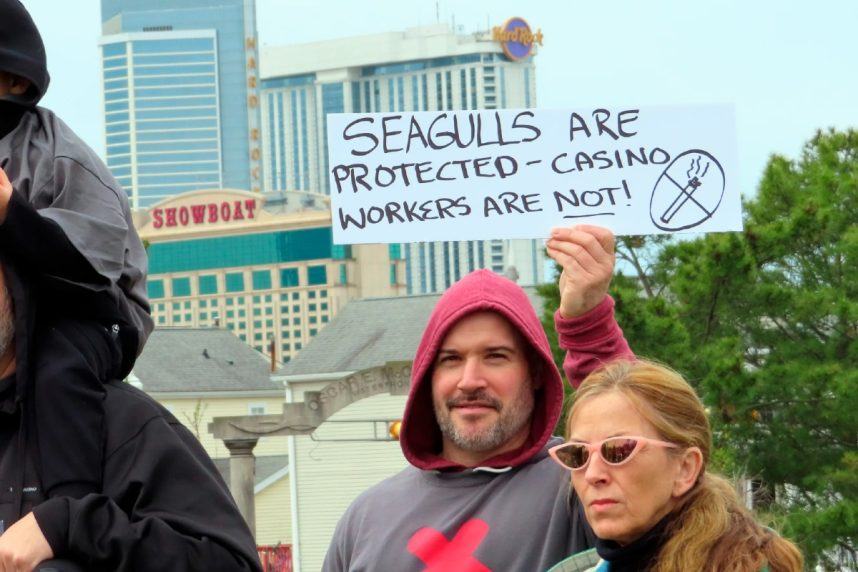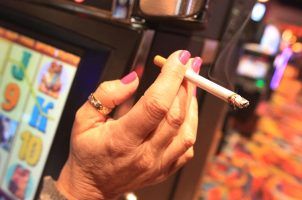Atlantic City Casino Smoking Bill Fails to Muster Senate Committee Support
Posted on: December 1, 2023, 10:23h.
Last updated on: December 2, 2023, 12:52h.
Legislation to extinguish Atlantic City casino smoking indoors failed to gain adequate support during a state Senate committee hearing on Thursday.

The Senate Health, Human Services, and Senior Citizens Committee couldn’t rally enough votes to forward the bill to the full Senate floor. That’s despite widespread bipartisan support in each legislative chamber of the New Jersey Legislature for the casino smoking measure,
Senate Bill 264 was introduced in January 2022 by Sens. Joseph Vitale (D-Northern Middlesex) and Shirley Turner (D-Mercer). The legislation proposes amending the state’s 2006 Smoke-Free Air Act to close the loophole that allows casinos and simulcasting facilities to designate up to 25% of their gaming floor space for indoor smoking.
Vitale, who chairs the eight-member Senate Health Committee, said he was a vote shy of having a majority to pass the smoking statute. He apologized to the many casino workers who made the drive to the Trenton capital in hopes of seeing history made with the first vote in favor of amending the state’s smoking law since it was passed 17 years ago.
Casinos Encouraged to Participate
Sen. Fred Madden (D-Gloucester), the vice-chair of the committee, said there should be more consideration of floated solutions from the casinos before elected officials simply force a complete smoking ban. One such solution from the gaming industry is to create fully enclosed gaming rooms where smoking would be allowed.
The state casino lobby, known as the Casino Association of New Jersey (CANJ), represents the interests of the nine Atlantic City casinos in Trenton. CANJ-commissioned research on the economic impact of a complete smoking ban suggested that as many as 2,500 jobs would be lost because of reduced gaming play and revenue.
Madden said he didn’t seek public office “to start taking people’s livelihoods away,” but he conceded that it’s “important to put health first.”
Casino workers seeking a clean indoor air workplace say Madden isn’t valuing their health. A statement to Casino.org from members of Casino Employees Against Smoking Effects (CEASE), the grassroots coalition pushing Senate Bill 264 and its Assembly counterpart, Assembly Bill 2151, said they aren’t willing to compromise.
We are continuing to have conversations with legislators to make clear the dangers of the ideas casinos are suggesting — such as Philip Morris smoking rooms in which workers would supposedly volunteer to work. It’s an absurd idea and every legislator should reject it. We won’t compromise our health. After all, we have been living with a compromise for the last 17 years when the casino smoking loophole was first created,” the CEASE statement read.
CANJ President Mark Giannantonio, who is president and CEO of Resorts, celebrated the committee’s decision and said it shows “people are beginning to realize the bill, as drafted, will have a significant adverse effect on Atlantic City’s economy.”
Smoking Prevalence Declines
Atlantic City’s gaming interests say a smoking ban would result in gamblers who smoke patronizing casinos in nearby Philadelphia, where indoor tobacco use remains.
The CDC says the US smoking rate has dropped to an all-time low, with just one in nine adults identifying as a smoker. The CDC has also pushed back on casinos claiming that their ventilation systems adequately protect patrons and workers.
In February, the federal health agency said in its report, “What Happens in Vegas, Stays in Your Lungs,” that the only way to protect public health inside businesses is to fully prohibit smoking. The CDC found elevated levels of dangerous Particulate Matter (PM) in areas of casino floors that are supposedly smoke-free sections.
Related News Articles
Atlantic City Casino Smoking Ban May Be Considered After Election
Atlantic City Casino Smoking Legislation Set for Senate Committee Hearing
NJ Assembly Committee to Hear Arguments Against Atlantic City Casino Smoking
Most Popular
LOST VEGAS: The Foster Brooks Robot at MGM Grand
Bally’s Sets Date for Tropicana Las Vegas Implosion & Party
Most Commented
-
VEGAS MYTHS RE-BUSTED: You Don’t Have to Pay Resort Fees
— August 2, 2024 — 16 Comments -
VEGAS MYTHS RE-BUSTED: Elvis Was a Straight-Up Racist
— August 9, 2024 — 11 Comments -
ANTI-SOCIAL BEHAVIOR: Vegas Casino Buffet Stunt in Poor Taste Goes Viral
— August 16, 2024 — 7 Comments -
VEGAS MYTHS RE-BUSTED: The Strip Tried Appealing to Families and Failed
— August 23, 2024 — 7 Comments
















Last Comment ( 1 )
the top two casino in pa are smoke free by choice the number one casino in the usa outside las vegas is mgm national harbor and its smoke free